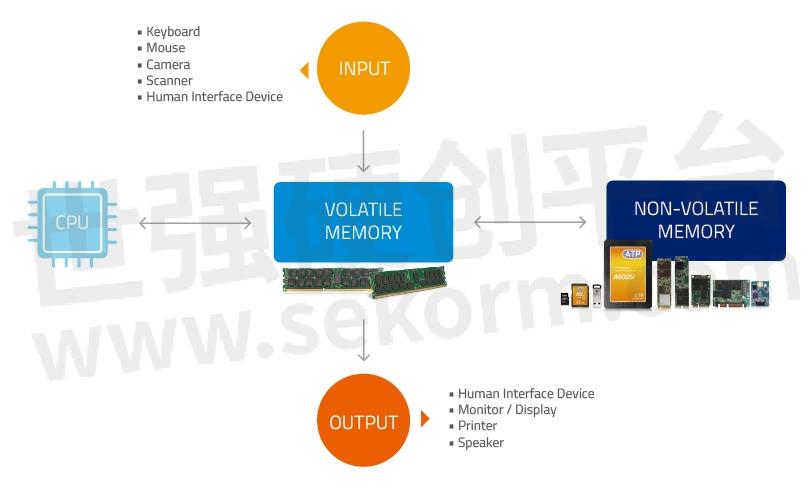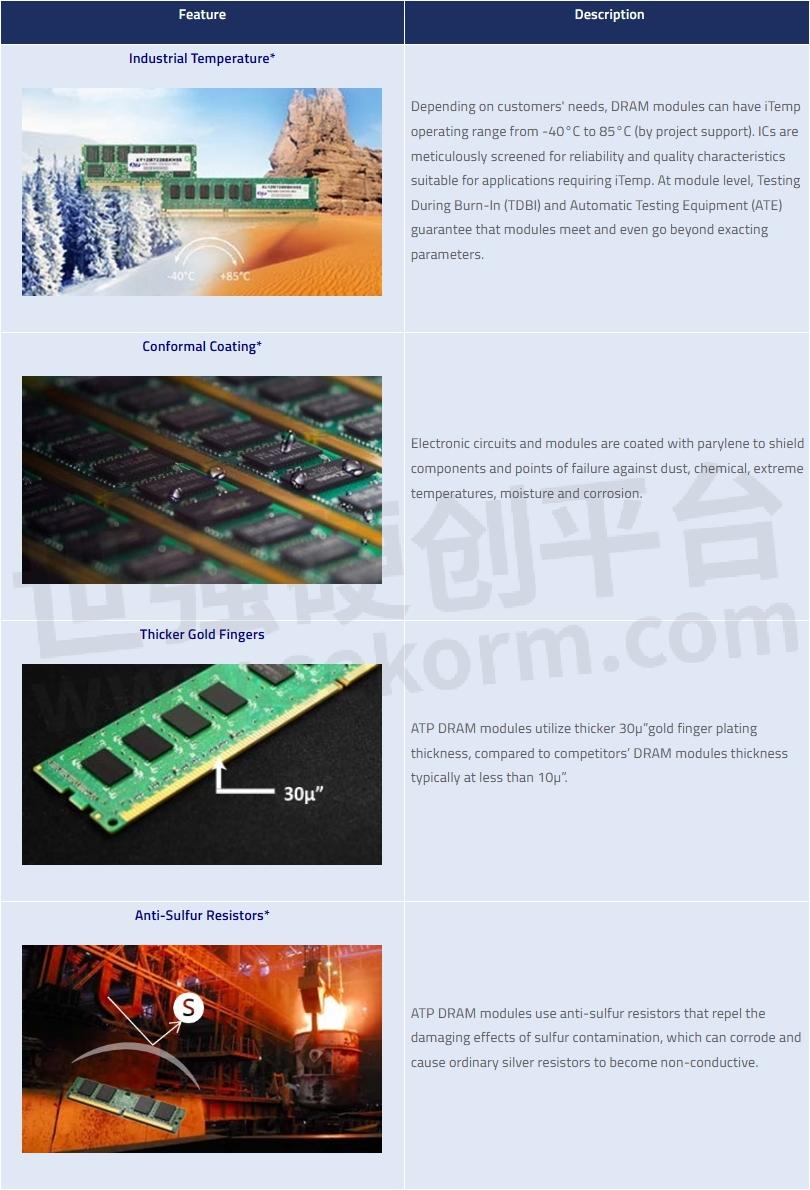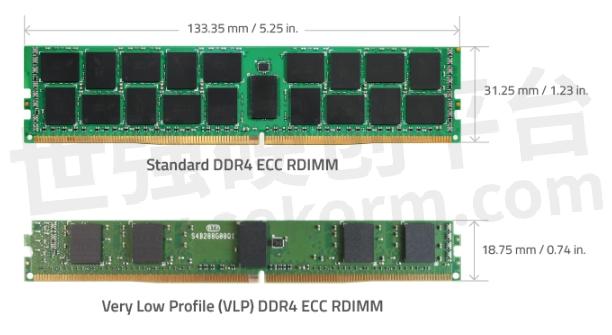The Important Role of DRAM in the Internet of Things




Dynamic Random Access Memory (DRAM) is used mostly as main memory in personal computers and consumer electronics, providing working memory for the processor. "Random" in DRAM denotes that the central processing unit can access any part of the memory directly instead of doing so in a particular order or sequence.
Often referred to as simply "memory," RAM allows data to be processed without the processor having to access the slower secondary memory (storage) such as solid state drives (SSDs) or hard disk drives (HDDs). Main memory is faster than secondary memory, so it is vital to know the right amount of memory needed in order for your system to deliver the performance you need.
In recent years, the use of DRAM has been increasingly extending beyond the personal computer and consumer electronics sphere. Higher capacities and low latencies are among the driving factors why DRAM is figuring extensively in industrial applications such as smart factories, health care, military, automotive, networking systems and data centers.
DRAM as a Key Component in Data Processing
DRAM is an essential part of data processing. The processor directly accesses it, allowing the processor to access multiple applications and services simultaneously. DRAM is faster than flash storage, but it is volatile; meaning, it loses data when power is terminated. Thus, data in DRAM should be flushed to non-volatile secondary memory such as a solid state drives (SSDs), hard disk drives (HDDs), or removable media like memory cards, thumb drives or compact discs.

Figure 1. Simplified diagram of the data flow in the processor-memory subsystem.
As the avalanche of data from connected devices in the Internet of Things (IoT) and industrial IoT (IIoT) continues to swell, processors are becoming more powerful and DRAM solutions should be able to keep up with the amplified data processing demands.
The Intel® Xeon® Scalable platform (Purley), for example, can support up to eight 6th generation Intel® Core™ processors (Skylake) with each processor having the computing power of up to 28 cores, supporting six DDR4 memory channels. Each memory channel can support up to two DIMMs (total of 12 DIMMs per processor) for up to 96 DDR4 DIMMs in a fully configured system.
The illustration below shows the Purley memory architecture showing each processor supporting up to 12 DIMMs.

Figure 2. Sample two-socket configuration.
Each CPU in the Intel® Xeon® Scalable platform can support up to six DDR4 memory channels. Each memory channel supports up to two DIMMs for a total of 12 DIMMs supported on each CPU.
DRAM as an Enabling Technology for Advances in IoT/IIoT
The IoT/IIoT is practically connecting everything everywhere, giving rise to connected cars, intelligent factories, smart homes and buildings, smart cities, smart farms and more. At the heart of this colossal phenomenon is the relentless generation of data—data that need to be collected, processed, aggregated and stored either locally, at the edge or transmitted to the cloud.
The unending flow of data underscores the growing need for memory with higher capacities, accelerated performance, and extended endurance. In automotive applications alone, sensors from Advanced Driver Assistance Systems (ADAS) require powerful processors that in turn necessitate higher memory capacities and bigger bandwidths. Likewise, high-resolution imaging for machine vision systems in smart factories, video surveillance and aerospace applications require fast, reliable, and cost-effective high-density memory. Whether data is processed at the source, at the edge or in the cloud, DRAM is clearly an important component of IIoT/IoT.
Industrial DRAM and IoT/IIoT Challenges
●Higher Density, Faster Performance for Memory-Intensive Workloads
In the IoT, huge amounts of data must be processed. Some of the processing will happen at the edge where analytics and rapid responses are needed in real time; some will happen in the cloud, where big data is stored or warehoused and analyzed for future decision-making.
ATP Electronics' DRAM solutions feature built-in enterprise-level density, which dramatically increases the capabilities of growing embedded and cloud computing environments to meet large-scale, memory-intensive workloads. The latest DDR4-2666 modules offer increased interface speed from 2400/MTs to 2666 MT/s, for up to 15% improvement in theoretical peak performance.
●Robust Operation in Harsh Environments
The IoT/IIoT is transforming the way business is done. By interconnecting people and machines, it improves processes and enhances productivity. Typically, IoT/IIoT devices are installed in settings with variable temperatures and a myriad of environmental hazards that can compromise the physical devices as well as the data in them.
Fully aware of such challenges, ATP designs and builds all its DRAM solutions to deliver reliable, robust performance in any environment.

* Available on a project basis.
Table 1. Protective technologies for ATP DRAM modules.
Data Integrity for Mission-Critical Applications
In the IoT/IIoT era, data is very valuable. To ensure the integrity of data while temporarily stored in DRAM, dual in-line memory modules (DIMMs) with error correcting code (ECC) are used in mission- and business-critical applications. Select ATP DRAM modules also feature Advanced ECC (ChipKill™) technology to detect and correct multi-bit errors that standard ECC may not be able to correct. Read more about common memory errors and how ECC DIMMs work in this blog post.
Energy and Space Efficiency
Many IoT/IIoT devices are designed with small footprints in order to fit in compact spaces. Often, they are always ON, hence the need for low-power operation. ATP DRAM modules are available in low-voltage options The DDR4 family consumes only 1.2V power, while DDR3 modules come in 1.5V (normal) and 1.35V (low voltage) options for cooler operation and lower energy costs. Different form factors give an expansive range of choices suitable for different usage cases, such as very low and ultra-low profile DIMMs. The photos below show a standard height and very low profile (VLP) DDR4 ECC RDIMM.

Figure 3. Select ATP DRAM modules are available in VLP option, such as the DDR4 Registered DIMM (RDIMM) with ECC.
The upsurge of innovative products and applications brought about by the IoT/IIoT is also creating increase in memory demand as sensors, devices and things create data at unprecedented rates. High-performance computing (HPC) applications for telecommunication infrastructures, networking storage systems, network-attached storage (NAS) servers, micro/cloud servers, and embedded systems will require accelerated processing and memory solutions with high density, low power, great scalability and efficiency.
ATP DRAM products are capable of meeting the escalating memory requirements of the IoT/IIoT age. Designed, tested, validated and built to exacting industry standards, these modules are built to perform dependably for a long time, delivering trustworthy performance that translates to high return on investment and low total cost of ownership.
- |
- +1 赞 0
- 收藏
- 评论 0
本文由涂抹转载自ATP,原文标题为:The Important Role of DRAM in the Internet of Things,本站所有转载文章系出于传递更多信息之目的,且明确注明来源,不希望被转载的媒体或个人可与我们联系,我们将立即进行删除处理。
相关推荐
How Memory Technologies Have Impacted the Industrial Robotics Industry and Automation
In this paper, from industrial robots to DDR DRAM technology innovation and iteration, in the rapid development of data today with the advancement of industry 4.0, the future of smart factories will become more intelligent, analyzed the development of storage, but also looked forward to the future development of storage products.
From Edge Computing to Sustainability: How AI is Transforming Industrial Robotics and Smart Factories
The latest high-performance memory solutions, like DDR5 and CXL, provide the computational power and storage capacity to create state-of-the-art smart factories, while memory chips from previous technology generations serve as reliable high-performance memory components for robust and flexible industrial robotics applications.
How Temperature Affects Data Retention for SSDs
How can the integrity of data written on the flash drive be guaranteed at high operating or storage temperatures?
【经验】什么是常见内存错误类型?ECC DIMM如何工作?
损坏的主内存可能会因性能下降或硬件崩溃而中断业务运营,从而导致代价高昂的停机时间。动态随机存取存储器(DRAM)模块通常具有解决存储器错误的内置机制。这篇文章回答了有关计算机内存错误的最常见问题,以帮助您确保关键任务系统中安装的DRAM的高实用性和最大的可靠性。ATP 可提供软错误可纠错的DRAM产品。
Zetta Memory‐ EEPROM/NOR/NAND/DRAM
型号- ZD24C512,ZD24C1M,ZDSD02G,ZDV4256M16A‐13DPH,ZDSD04G,ZD24C256,ZDV4256M16A‐11DPH,ZDSD64G,ZDSD32G,ZDSD256G,ZD24C64,ZD24C02,ZDEMDCM032G-84A8,ZDSD16G,ZD24C08,ZD25Q16C,ZDV4256M16A‐11IPH,ZDSD08G,ZDEMDCM016G-84A8,ZDV4256M16A‐13IPH,ZDV4128M16A‐13DPH,NB25Q40A,ZD25WQ80C,ZDV4128M16A‐13IPH,ZDV4128M16A‐11IPH,ZDV4128M16A‐11DPH,ZD24C128,ZDSD01G,ZD25WQ16C,ZD24C2M,ZDSD128G,ZD25Q128C,ZDV4256M16A‐14DPH,ZD24C32,ZD25WQ32C,ZD24C16,ZDV4256M16A‐14IPH,ZDEMDIW008G-84A8,ZD25Q80C,ZD25Q32C,ZD25Q64B,ZDV4128M16A‐14IPH,ZDEMMC04G,ZDEMDIW016G-95A8,ZDEMMC08G,ZD25WD20C,ZDEMDCM064G-95A8,ZDV4128M16A‐14DPH
SMART’s RUGGED T5E | M.2 2280 SATA
型号- T5E,HRCA3P1920HIS01,HRCA3P0960HIS01,HRCA3P0480HIS01,HRCA3P0240HIS01
【经验】DRAM的可靠性受什么因素影响?ATP DRAM为何具备高可靠性?
ATP的DRAM模块经过两个级别的测试,以确保最大的可靠性:1、先进的IC级集成电路测试;2、增强的模块水平测试:老化测试(TDBI)和自动测试设备(ATE)确保模块达到甚至超过合格参数。同时具有工业额定温度,采用密封涂层,使用使用抗硫电阻器(基于项目)和厚度为30µm的金手指镀层。
ATP Launches Its Tiniest PCIe Gen3 x4 NVMe™ SSDs in M.2 Type 1620 HSBGA Package
ATP Electronics, the global leader in specialized storage and memory solutions, has announced the launch of its tiniest NVMe flash storage offering: the N700 Series PCIe® Gen3 x4 NVMe™ solid state drives (SSDs, which are available as M.2 Type 1620 heatsink ball-grid array (HSBGA) package.
SMART’s RUGGED T5PF | 2.5′′ SATA
型号- T5PF,HRHA2F0480HC001,HRHA2F3840HC001,HRHA2F3840HI001,HRHA2F0960HC001,HRHA2F0480HI001,HRHA2F0960HI001,HRHA2F1920HI001,HRHA2F1920HC001
ATP‘s Power Loss Protection Just Got Smarter with MCU-based SSD Design
ATP customers want constant assurance that power loss events will not cause massive downtime or lost data that could affect business operations and lead to higher operating costs. The MCU intelligently monitors sudden power failure conditions from a glitch to a surge or a complete outage...
The ATP Gym and Coach System: Exercising SSDs to Ensure Total Fitness
With the Gym and Coach system, ATP has dramatically improved RDT and the initialization process for functional test details. By making industrial SSDs undergo a lot of “painful” exercises through stringent testing, ATP makes sure that customers have everything to gain by receiving the most robust, reliable and enduring flash storage products for their applications.
SMART’s RUGGED S5E | 2.5′′ SATA
型号- S5E,HRCA2X0480AI001,HRCA2X0120AC001,HRCA2X0120AI001,HRCA2X0240AC001,HRCA2X0060AI001,HRCA2X0060AC001,HRCA2X0240AI001,HRCA2X0480AC001
DDR4-3200 DRAM Solutions Deliver Memory Boost to AMD EPYC™ and 2nd Gen Intel® Xeon® Scal | ATP
Taipei, Taiwan (March 2020) – ATP Electronics announces the release of fast, low-power DDR4-3200 solutions to take full advantage of the latest AMD EPYC™ Family and 2nd Generation Intel® Xeon® Scalable Processors (formerly codenamed Rome and Cascade Lake, respectively). ATP’s DDR4-3200 modules ensure a big boost in performance, compute density and productivity with their fast 3200 MT/s data rate to optimize the power of AMD’s eight-memory channel and Intel’s six-memory channel architectures.
SMART’s RUGGED T5E | 2.5′′ SATA
型号- T5E,HRCA2X0160JI001,HRCA2X0960HI001,HRCA2X0160JC001,HRCA2X0080JC001,HRCA2X0640JI001,HRCA2P0960HILM1,HRCA2X1280JC001,HRCA2X0640JC001,HRCA2X0120HI001,HRCA2X1280JI001,HRCA2X1920HI001,HRCA2P0480HILM1,HRCA2X0080JI001,HRCA2X0120HC001,HRCA2X0240HI001,HRCA2X1920HC001,HRCA2X0240HC001,HRCA2X3840HC001,HRCA2X0480HC001,HRCA2X0960HC001,HRCA2X0040JC001,HRCA2X0320JI001,HRCA2X0040JI001,HRCA2X3840HI001,HRCA2X0480HI001,HRCA2X0320JC001
电子商城
现货市场





































































































































































































登录 | 立即注册
提交评论